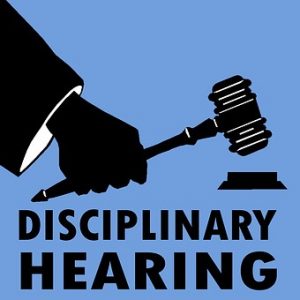Civil Service Disciplinary Procedures at the Employer Level
Because the purpose of the New Jersey Civil Service System is to remove politics, nepotism and favoritism from the hiring and disciplinary processes to ensure that employment decisions are based on merit and fitness, just cause must be found for imposing discipline. And because the employer is the government, all discipline, New Jersey’s Court’s have explained, “is governed by principles of notice, due process and fundamental fairness.” The key to this is notice and the opportunity to be heard at a hearing.
processes to ensure that employment decisions are based on merit and fitness, just cause must be found for imposing discipline. And because the employer is the government, all discipline, New Jersey’s Court’s have explained, “is governed by principles of notice, due process and fundamental fairness.” The key to this is notice and the opportunity to be heard at a hearing.
Written Notice and the Opportunity for a Hearing Before Appointing Authority
Before disciplinary action may be taken against a permanent civil service employee or during an employee’s working test period, the employee must get written notice and the opportunity for a hearing on major discipline. This notice comes in the form of a “Preliminary Notice of Disciplinary Action” (“PNDA”). The PNDA must set forth the charges and give a specification. It must give the employee the opportunity for a hearing prior to major discipline. The PDNA should give the employee notice of all the charges and specifications against him so he can prepare a defense.
Immediate Suspensions; Exemptions to Notice Requirement
Limited exceptions to the preliminary notice requirement apply. The first exception provides that an immediate suspension may be imposed prior to a hearing when the determination has been made that the employee is unfit for duty or would be a danger to any person if she was allowed to continue working pending discipline, or that it is determined that the employee must be suspended immediately for reasons of safety, health, order or effective provision of public services. However, a PNDA with opportunity for a hearing must be served in person or by certified mail within five days following the immediate suspension.
The second exception is that “An employee may be suspended immediately when the employee is formally charged with a crime of the first, second or third degree, or a crime of the fourth degree on the job or directly related to the job.”
However, the same regulation goes on to state that when an employee is suspended without pay she must first be apprised, orally or in writing, “of why an immediate suspension is sought, the charges and general evidence in support of the charges and provided with sufficient opportunity to review the charges and the evidence in order to respond to the charges before a representative of the appointing authority. The response may be oral or in writing, at the discretion of the appointing authority.”
Hearings
Before major discipline may be imposed on a permanent employee in the career civil service or an employee employed during a working test period, the employee must receive the opportunity for a hearing by the employer. When an employee is served with a PNDA for major discipline, she may request a hearing within five days. The hearing must be held within 30 days of the notice unless waived by the employee. Failure to request a hearing in five days may be considered a waiver, allowing the employer to issue final discipline in a Final Notice of Disciplinary Action (“FNDA”).
The employee may be represented by an attorney or union representative. A full evidentiary hearing will be conducted, and the parties will have the opportunity to review the evidence and present and examine witnesses. Employees are not required to testify, but will be subject to cross-examination if they do.
Appointing Authority Decision
The appointing authority must render a decision within 20 days after the disciplinary hearing, or later if agreed to by the parties.
Contact Us
Our New Jersey employment lawyers represent government employees in all aspects of civil service hiring and discipline. Call us at (973) 890-0004 to schedule a consultation. We can help.
 New Jersey Lawyers Blog
New Jersey Lawyers Blog

